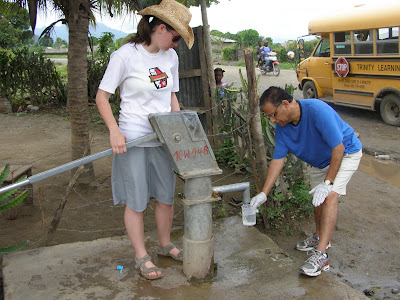By Sam Usem, CTI Volunteer, Haiti
Over 1 billion people on the planet lack access to clean water. Furthermore, they lack access to the means to create clean water systems. CTI and senior engineering students at the University of St. Thomas have created a new prototype device that can hopefully purify 5 gallons of water in less than 20 minutes. The device, or "Water Aqualyser" as it is known, sends an electrical current through salted water, converting the salt into chlorine that kills bacteria. The device has worked in Minnesota flawlessly but now it is time for testing in the field.
Two volunteers from CTI, Dr. Murali and Sam Usem, have accompanied 3 students from the University of St. Thomas to Cap-Haitian in the North of Haiti to test the Water Aqualyser in local communities. They are being helped by the Haitian nonprofit Sonje Ayiti and the Texas-based nonprofit Living Waters International to identify contaminated wells that are being used on a daily basis. The group arrived to Haiti on June 5th and is already hard at work testing and identifying contaminated wells that they can test the new equipment on.
The team has tested 24 well sites, and already found signs of that bacteria and E coli are present. In the next few days the team will start to test the Water Aqualyser equipment under different parameters to try to cut down the time needed to purify the water. The end goal is a system that costs less than $50 dollars and takes less than 20 minutes to purify 5 gallons of water. More importantly, we are trying to development technologies that are appropriate and thus will be used by the local populations, so the team has been taking extensive notes with the local population on what has and has not worked in the past. As the unit is tested they will have local Haitians try the unit out themselves and give user feedback.
Now that the wells have been found, testing of the equipment itself begins tomorrow, so check back soon for more updates from the field.
Over 1 billion people on the planet lack access to clean water. Furthermore, they lack access to the means to create clean water systems. CTI and senior engineering students at the University of St. Thomas have created a new prototype device that can hopefully purify 5 gallons of water in less than 20 minutes. The device, or "Water Aqualyser" as it is known, sends an electrical current through salted water, converting the salt into chlorine that kills bacteria. The device has worked in Minnesota flawlessly but now it is time for testing in the field.
 |
| CTI volunteers test well water for bacteria in Haiti |
The team has tested 24 well sites, and already found signs of that bacteria and E coli are present. In the next few days the team will start to test the Water Aqualyser equipment under different parameters to try to cut down the time needed to purify the water. The end goal is a system that costs less than $50 dollars and takes less than 20 minutes to purify 5 gallons of water. More importantly, we are trying to development technologies that are appropriate and thus will be used by the local populations, so the team has been taking extensive notes with the local population on what has and has not worked in the past. As the unit is tested they will have local Haitians try the unit out themselves and give user feedback.
Now that the wells have been found, testing of the equipment itself begins tomorrow, so check back soon for more updates from the field.
No comments:
Post a Comment